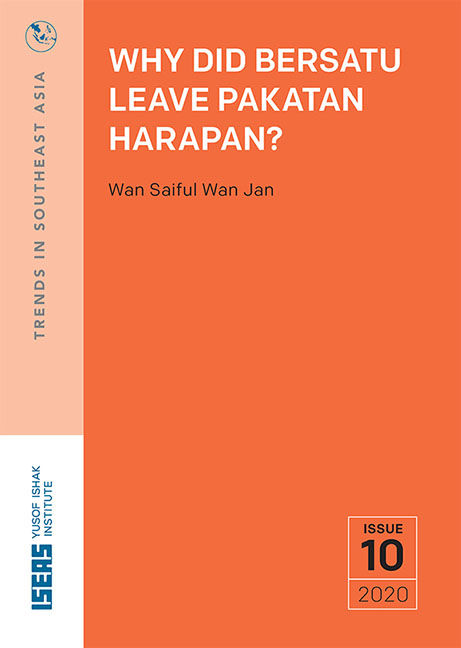Why did BERSATU Leave Pakatan Harapan?
Published online by Cambridge University Press: 17 December 2021
Summary
EXECUTIVE SUMMARY
• The Pakatan Harapan (PH) coalition won Malaysia's 14th general election on 9 May 2018, the first time a regime change took place in the country. However, it lost its majority in late February 2020, when Parti Pribumi BERSATU Malaysia (BERSATU) left the coalition.
• The four parties in PH had very different ideologies, especially when it comes to issues of race and religion. But despite taking various steps to create a coalition agreement, the more fundamental differences were never reconciled during the coalition's time in power.
• PH won GE-14 with a relatively low level of support from the ethnic Malays, who perceived it to be a coalition dominated by the mainly Chinese DAP. Fearmongering about how PH and the DAP were a threat to Malay privileges further weakened PH while in government.
• Furthermore, BERSATU disliked the possibility that Parti Keadilan Rakyat (KEADILAN) president Anwar Ibrahim might succeed Mahathir Mohamad as prime minister. They did not trust Anwar to champion the Malay agenda if he became prime minister.
• BERSATU decided as early as in 2019 to explore leaving PH to form a new Malay-led government, and saw the departure as a necessary step for a better chance at winning GE15.
• This was a controversial decision and it created a major rift within BERSATU itself, with party chairman and then Prime Minister Mahathir Mohamad refusing to accept the party's decision to leave PH.
• Following Mahathir's sudden resignation on 24 February 2020, BERSATU immediately announced their departure from PH. This led to a series of events that culminated in the collapse of PH and the formation a Perikatan Nasional government led by the three biggest Malay parties, UMNO, BERSATU and PAS.
• The whole episode shows that any coalition or political parties that wish to govern Malaysia must not ignore sentiments among the Malays, especially those in rural areas.
- Type
- Chapter
- Information
- Why Did Bersatu Leave Pakatan Harapan? , pp. vii - viiiPublisher: ISEAS–Yusof Ishak InstitutePrint publication year: 2021



